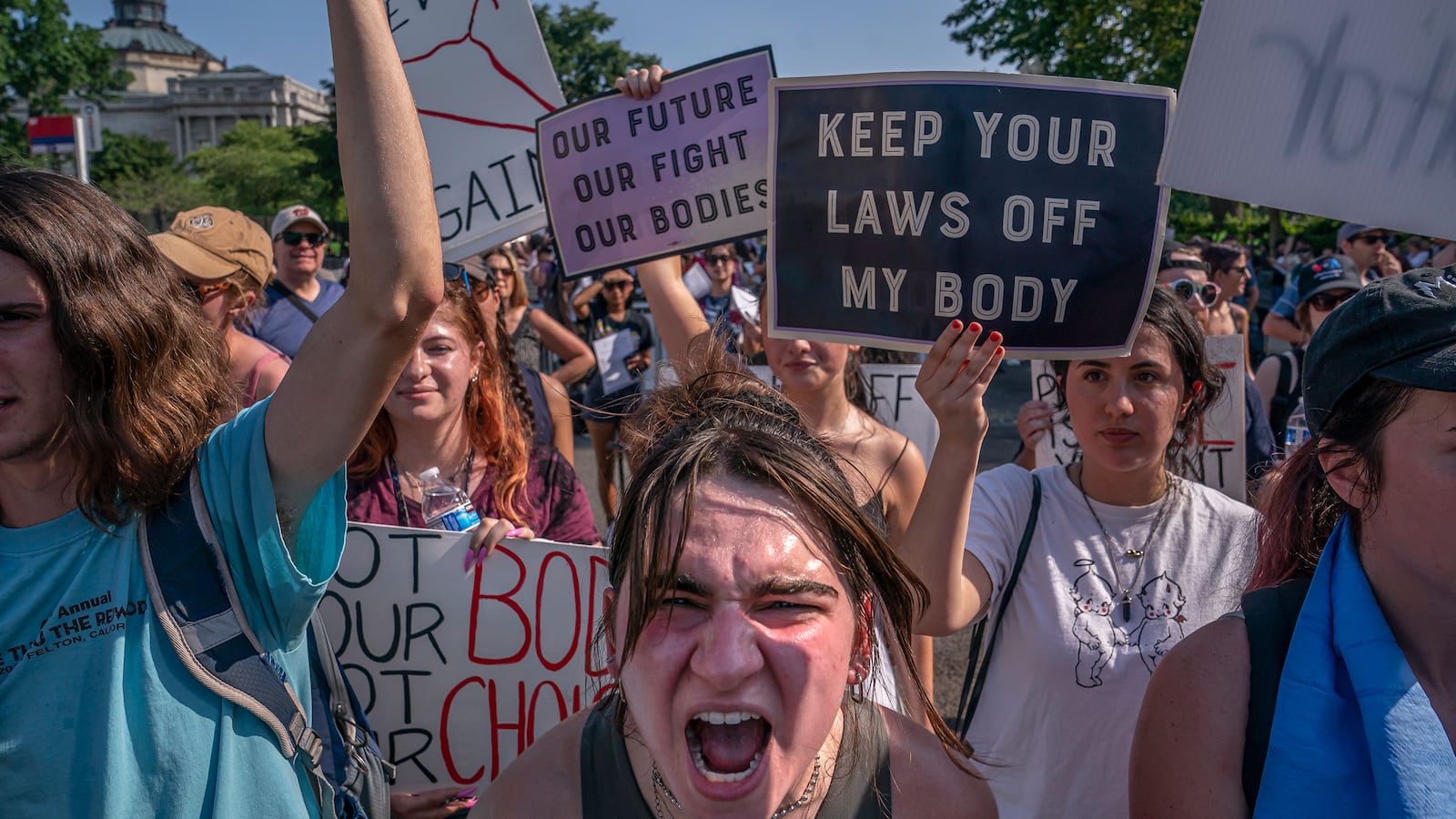The Supreme Court’s ruling in Dobbs v. Jackson confirmed the worst fears of reproductive rights activists when six justices undid decades of legal precedent and wiped away the constitutional right to abortion.
Just weeks later, abortion bans have taken effect)" href="https://urldefense.com/v3/__https://www.washingtonpost.com/politics/2022/06/24/abortion-state-laws-criminalization-roe/__;!!LsXw!UTjlc6pwwXObGo5qeZ2o08lujT5s63zYVapj0KMdYdRoqSoM3lQxdGNsBjojJqWu7Pght6IyCIdm4e2fVFd-9AO-hqTsdP0xppRd$">have taken effect in 11 states, with at least four more soon to follow. The bans will expand into other states, some of which will bar not just the procedure, but our ability even to talk about it.
Human rights are interdependent, and the fall of Roe v. Wade sets in motion a dangerous array of consequences that will cascade far beyond the gutting of abortion rights. The decision immediately triggered laws in many states that criminalize not just the person seeking an abortion, but also those who attempt to provide the services. Abortion access starts with access to information, and free expression is imperiled when information-sharing is considered a crime.
Moves are being made around the country to curtail abortion-related speech.
Already, in Missouri)" href="https://urldefense.com/v3/__https://www.kansascity.com/news/politics-government/article262796208.html__;!!LsXw!UTjlc6pwwXObGo5qeZ2o08lujT5s63zYVapj0KMdYdRoqSoM3lQxdGNsBjojJqWu7Pght6IyCIdm4e2fVFd-9AO-hqTsdOAocGrs$">Missouri, a measure attached to a rash of proposed bills would criminalize aiding anyone seeking abortion care out of state, borrowing Texas's approach)" href="https://urldefense.com/v3/__https://www.washingtonpost.com/politics/2022/03/08/missouri-abortion-ban-texas-supreme-court/__;!!LsXw!UTjlc6pwwXObGo5qeZ2o08lujT5s63zYVapj0KMdYdRoqSoM3lQxdGNsBjojJqWu7Pght6IyCIdm4e2fVFd-9AO-hqTsdNgrTM2q$">borrowing Texas's approach in turning enforcement over to private citizens. Another proposed Missouri bill would prohibit)" href="https://urldefense.com/v3/__https://house.mo.gov/billtracking/bills221/sumpdf/HB1987I.pdf__;!!LsXw!UTjlc6pwwXObGo5qeZ2o08lujT5s63zYVapj0KMdYdRoqSoM3lQxdGNsBjojJqWu7Pght6IyCIdm4e2fVFd-9AO-hqTsdBN76xmB$">prohibit the use of “speech or writing as an integral part of conduct” with respect to an abortion. Though these proposals stalled prior to the Dobbs decision, they are clear indicators of what is on the horizon. In Arkansas, a trigger law)" href="https://urldefense.com/v3/__https://www.arkleg.state.ar.us/Bills/FTPDocument?path=*2FBills*2F2021R*2FPublic*2FSB149.pdf__;JSUlJQ!!LsXw!UTjlc6pwwXObGo5qeZ2o08lujT5s63zYVapj0KMdYdRoqSoM3lQxdGNsBjojJqWu7Pght6IyCIdm4e2fVFd-9AO-hqTsdEEbYI80$">trigger law that came into effect after Dobbs defines acts related to abortion so broadly as to leave open the possibility that educators, counselors, and other non-medical professionals could be targeted if they advise or educate on abortion resources or options.
The National Right to Life Coalition has proposed model legislation)" href="https://urldefense.com/v3/__https://web.archive.org/web/20220621021654/https:/www.nrlc.org/wp-content/uploads/NRLC-Post-Roe-Model-Abortion-Law-FINAL-1.pdf__;!!LsXw!UTjlc6pwwXObGo5qeZ2o08lujT5s63zYVapj0KMdYdRoqSoM3lQxdGNsBjojJqWu7Pght6IyCIdm4e2fVFd-9AO-hqTsdOsTA9M6$">model legislation designed to put in place “an effective enforcement regime” in a post-Roe world. It would, for a start, criminalize providing information “by telephone, the internet, or any other medium of communication, regarding self-administered abortions or the means to obtain an illegal abortion, knowing that the information will be used, or is reasonably likely to be used, for a self-administered abortion or an illegal abortion;” hosting a website that “encourages or facilitates” abortion access; or providing a referral to an abortion provider.
If enacted, these prohibitions on speech would drastically erode basic rights to free expression. But the stark truth is that even where they don’t become law, the specter of these legislative efforts can curb speech all on its own.
The fear of criminal reprisal, the lack of clarity on the ramifications of searching for, sharing, or providing information about abortion in a state where it is already illegal or soon to be—these concerns are enough to silence speech. Among other things, such provisions threaten to turn journalists who cover the abortion-rights movement into criminals, or at the very least cast a chill over entire categories of news coverage.
The chilling effect could disproportionately harm)" href="https://urldefense.com/v3/__https://prismreports.org/2022/06/22/nrlc-model-law-journalists-at-risk/__;!!LsXw!UTjlc6pwwXObGo5qeZ2o08lujT5s63zYVapj0KMdYdRoqSoM3lQxdGNsBjojJqWu7Pght6IyCIdm4e2fVFd-9AO-hqTsdEUScruD$">disproportionately harm activists and journalists on the front lines of the issue, especially the women of color and LGBTQ+ people who spearheaded the reproductive justice movement.
The Dobbs decision could also inspire efforts to force the major online platforms to block access to abortion-related information for certain users. Democratic Sen. Ron Wyden of Oregon—the architect of the foundational internet speech law known as Section 230—has warned)" href="https://urldefense.com/v3/__https://slate.com/technology/2022/06/roe-supreme-court-online-privacy-speech-wyden.html__;!!LsXw!UTjlc6pwwXObGo5qeZ2o08lujT5s63zYVapj0KMdYdRoqSoM3lQxdGNsBjojJqWu7Pght6IyCIdm4e2fVFd-9AO-hqTsdGCTMsse$">warned that anti-abortion activists and Republican lawmakers could flood social media companies with demands to restrict the free flow of information about abortion. Axios has also predicted)" href="https://urldefense.com/v3/__https://www.axios.com/2022/06/28/tech-companies-surrender-abortion-related-data__;!!LsXw!UTjlc6pwwXObGo5qeZ2o08lujT5s63zYVapj0KMdYdRoqSoM3lQxdGNsBjojJqWu7Pght6IyCIdm4e2fVFd-9AO-hqTsdKAIr3G4$">predicted that when law enforcement authorities demand the personal data of users suspected of seeking abortions, Big Tech companies may very well comply.
Laws such as HB 20 in Texas—which, as the The Texas Tribune put it, would require large social media companies to “produce regular reports of removed content, create a complaint system and disclose their content regulation procedures”—raised the prospect of a splintered internet)" href="https://urldefense.com/v3/__https://pen.org/report/splintered-speech-digital-sovereignty-and-the-future-of-the-internet/__;!!LsXw!UTjlc6pwwXObGo5qeZ2o08lujT5s63zYVapj0KMdYdRoqSoM3lQxdGNsBjojJqWu7Pght6IyCIdm4e2fVFd-9AO-hqTsdFhUVhqe$">splintered internet here in the United States, where it's permissible to say something online in one state but not the next. The Dobbs decision reanimates similar concerns about patchwork access to essential—and potentially life-saving—information.
Beyond the alarming legal implications, the reversal of Roe represents another, more insidious assault on freedom of expression.
Abortions are part of women’s stories—research suggests 1 in 4 American women or girls have had them, and countless others considered them. Despite their prevalence, talking about that experience has long been taboo. But in recent years, activists have worked to remove the stigma associated with talking about abortion, and more and more people have spoken up about their experiences, in their communities, on social media, in the press, and through artistic and creative works.
The criminalization of abortion, and the introduction of bills that could make people afraid even to speak the word, will cast a shadow over the voices of many women and other people for whom abortion is a part of their story. This silencing may be less visible or dramatic, but it is another grim consequence of this decision.
When the Supreme Court overturned Roe, it didn’t just set abortion access back by decades. The court’s attack on women’s bodily autonomy amounts to an attack on our stories—and everyone’s right to free expression.
Nadine Farid Johnson and Summer Lopez are Washington director and senior director of free expression programs at the free-speech organization PEN America.









